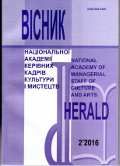POSTFOLKLORE AS A SUBJECT OF HUMANITIES RESEARCH: PROPOUNDING A QUESTION
DOI:
https://doi.org/10.32461/2226-3209.2.2016.138501Keywords:
postfolkolore, communication networks, Internet folklore, folklore and social practicesAbstract
The purpose is to consider postfolklore as an object of theoretical research in humanitarian discourse. Research methodology is to apply the general principle of scientific objectivity, cultural, structural-semantic and analytical methods for the study of theoretical works of humanities (philology, folklore), subject matter of which is associated with the concept of postfolklore. Scientific novelty lies in the comprehensive review of the concept of postfolklore as a subject of humanities research and determination of the necessity of cultural understanding of its phenomenology trends in the context of contemporary culture. Conclusions. The study has found that postfolklore as a phenomenon of modern culture is genetically related to classical folklore samples. However, on its external and internal features and characteristics it still belongs to principally new cultural level phenomenon, works of which not only reflect the mosaic reality, but also accumulate and transmit values, ideas and ideals of the society, acting as a kind of stabilizing principle in understanding of socio-cultural realities.
Downloads
Published
Issue
Section
License
Authors who publish with this journal agree to the following terms:
1. Authors retain copyright and grant the journal right of first publication with the work simultaneously licensed under a Creative Commons Attribution License that allows others to share the work with an acknowledgement of the work's authorship and initial publication in this journal.
2. Authors are able to enter into separate, additional contractual arrangements for the non-exclusive distribution of the journal's published version of the work (e.g., post it to an institutional repository or publish it in a book), with an acknowledgement of its initial publication in this journal.
3. Authors are permitted and encouraged to post their work online (e.g., in institutional repositories or on their website) prior to and during the submission process, as it can lead to productive exchanges, as well as earlier and greater citation of published work (See The Effect of Open Access).


